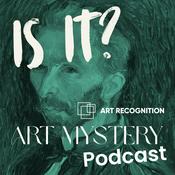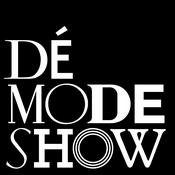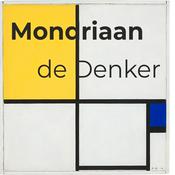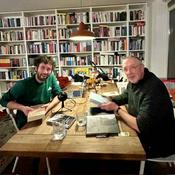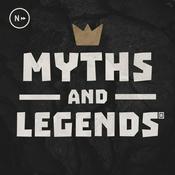783 afleveringen
Atomic Julie's Galactic Bedtime Stories - ULTIMATUM by Roger D. Aycock (Roger Dee)
25-8-2025 | 13 Min.How can you tell an alien from a madman?
ULTIMATUM
By ROGER DEE
In a dingy little Indiana hotel room the fate of
three worlds suddenly hung in precarious balance!
[Transcriber's Note: This etext was produced from
Planet Stories Spring 1950.
Extensive research did not uncover any evidence that
the U.S. copyright on this publication was renewed.]
Winant followed the lanky sheriff down the jail corridor past rows of empty, plank-walled cells and drew a sharp breath of relief when they found the last cubicle still tenanted.
"That's Uncle Ivor, all right," Winant said. "Sorry he caused you so much trouble, sheriff, but I'll be glad to pay his fine. What's the charge against him?"
The sheriff rubbed a palm across his drooping mustaches and looked doubtfully at the old man who sat on the edge of the cell bunk, the bald dome of his head cradled dejectedly in his hands.
"You couldn't rightly say there is a charge, mister," he admitted. "Your uncle popped into Ben Stuart's Drop Inn restaurant night before last with a little black box under his arm, naked as a jaybird and talking like a crazy man.
"'I'm a visitor from Mars,' he says. 'Take me to your president, and quick!' Ben thought he was crazy, or drunk, and ran him out with a meat cleaver, and the old duck went down to the Warner Hotel and pulled the same goofy act. Pop Warner called me, and I went down and threw the old coot into the cooler. I knew right off that he was cracked, because I even had to show him how to put on the clothes I brought him. And the wingding he pitched when I took that black box away from him—wow!"
Winant shook his head. "Poor Uncle Ivor," he said commiseratingly. "The last time he got away from us he thought he was Mahatma Ghandi, and tried to buy a bus ticket from Cincinnati to New Delhi, India. I found him, finally, in Evansville, Indiana. It's amazing how he got this far south, but then a mentally-unbalanced person can do surprising things, sometimes."
The sheriff snorted. "Unbalanced, hell," he said. "The old coot's crazy as a bed-bug. Just got in from Mars, he says, and he wants the president of the United States—on the double!"
He unlocked the door and Winant went inside.
"It's all right now, Uncle Ivor," he said gently. The old man raised a wrinkled, leathery face and stared at him uncomprehendingly. "Let's go over to my hotel and get a good meal and a hot bath," Winant urged. "Then we'll go home again. Ready, now?"
A few minutes later in the jail office the sheriff pocketed the bill Winant gave him and handed over a small lacquered metal box that was surprisingly heavy for its size.
"Here's your uncle's radio," he said. "New-fangled model, I reckon. I couldn't make head nor tail of it, so I just left it alone."
Winant lifted the hinged cover and looked inside the box at the neat array of tiny meters and knobs that covered the control panel.
"A wise decision, sheriff," he said dryly. "Wiser, perhaps, than you'll ever know."
The old man stood in the center of Winant's hotel room, the sheriff's ill-fitting denims hanging on his slight frame like the castoff clothing of a scare-crow.
"The box," he said. His voice, after talking for so long, was a hoarse, rasping croak. "Give me the box."
Winant sat in a decrepit wicker chair, holding the box in his lap, his eyes missing no detail of the old man's shrunken figure with its bald dome-like head and wrinkled parchment face.
"I'll give you the box when you tell me something that makes sense," he said. "What you've just told me is nothing but a rehash of the story you told the sheriff—that your name is Yardana and that you are an envoy from Mars, sent to Earth to help scientific authorities develop safe atomic power. Look—I'm a news writer, down here to investigate the rumors of a blue meteorite landing in the hills just north of here and to check up on the comic accounts I read of your appearance. I went to a lot of trouble and some risk to get you out of jail, and I want a reasonable story for my trouble. What about it, now?"
The old man wrung his hands. "Give me the box. Give me the box!"
"Later," Winant promised. "When you give me the real story behind this thing I'll not only give you back your box, I'll give you a lift out of this burg as well."
He looked at the old man sharply. "How could a Martian speak the kind of English you've been using? Why should a Martian look so much like an ordinary human being? It doesn't add up."
"We are of the same root stock," Yardana said. "Intelligent life follows the same evolutionary pattern, no matter where it develops, so long as conditions are the same. As for the language, my people have followed your experiments with electro-magnetics since their beginning. We know every language of Earth intimately, through long study of your radio programs."
Winant laughed. "Maybe the sheriff was right, at that," he said. "It's a goofy story, too fantastic for belief."
He shrugged and handed the old man the black box.
"Here's your toy," he said resignedly. "I guess that's all I'm going to get for my trouble; just enough misinformation for another tongue-in-cheek article for Sunday supplements."
He picked up his brief-case from the floor and laid it on the corner of the writing table at his elbow. "The lift I promised you still goes, if you want it, but it'll have to wait until tomorrow."
The old man took the black box eagerly and threw back the cover. His fingers flickered over the controls with practised familiarity.
"I shall not need your assistance—now," he said. His pale eyes met Winant's triumphantly. "Now that I have the Bubble again I have a means of return to my ship better than any Earthly conveyance could offer. Watch!"
From the black box swelled a pulsing radiance, a misty rose-tinted sphere that grew swiftly until it enveloped Yardana in a six-foot bubble of iridescent light. Through its wavering envelope the old man's face showed taut and purposeful, its pleading replaced by grim determination.
"Print your story," he said. "Tell your people about Yardana and his mission. Tell them too that their days are numbered from this minute, for in their savage perversion of natural principles to warlike uses they have forged a menace that threatens the peace of the Solar System and, eventually, of the universe itself."
He moved toward the window, the rosy Bubble glowing about him. Winant turned his chair slightly, watching, but he did not rise.
"My people knew the secrets of the atom," Yardana said, "before your own learned the use of fire. We built great cities and telescopes when your ancestors were troglodytes, living in caves and eating uncooked meat. We expected no dangerous intelligence to arise on your planet for thousands of years as yet, and we paid little attention to your progress until recently, when we learned through your radio broadcasts that you had cracked the atom. We knew then that something was dangerously wrong, and that we must investigate quickly before your sudden wisdom put you upon equal footing with us.
"Today, when you should be only learning to compound gunpowder, we find you applying electromagnetic principles which you cannot possibly understand, and harnessing the atom for the sole purpose of killing greater numbers of your fellow beings. I came here, not to aid your scientists in developing the rudiments of the atomic power they have discovered, but to find the reason behind the sudden freakish intelligence they are displaying. I have discovered that reason—the scientific and political powers of Earth are under the domination and guidance of alien intelligences, entities bent upon developing a race of Earthmen so warlike and so technically proficient in the waging of war that it must endanger our own Martian culture."
Winant sat unmoving, his eyes not leaving the Martian's wrinkled face. The Bubble hissed audibly, its tiny sussuration suddenly loud in the room.
"Therefore I shall recommend in my report that the human race be completely destroyed," Yardana said. "Alone it could not offer a serious threat against us for ages, but led and instructed by these outside intelligences it must soon surpass our own scientific development. And we must destroy you before you learn the secret of space travel, or we shall be too late to save ourselves.
"We fought with the peoples of Venus once in ages past for the same reason, and reduced them to inconsequence if not to extinction, for no sign of intelligent life has been detected upon their world since we blasted it three thousand years ago. When I have made my report the council of Elders will recommend the blasting of Earth, and the solar system will be safe again for our superior Martian civilization—this time forever."
"When you have made your report," Winant said. His smile was edged with a sudden secret amusement. "But suppose these 'alien entities' prevent your return?"
He opened the brief-case on the table and put a hand inside it. The Martian laughed harshly.
"No missile can penetrate a Bubble, you fool," he said contemptuously. "It is impervious to any Earthly weapon."
Winant laughed in turn, his lips pressed back flat against his teeth. The repressed hatred of three thousand years spoke in his voice, added pressure to the thrust of his thumb on the stud of the little silver tube in his hand.
"Of course it is," he said, as the sullen crimson ray from the tube disintegrated Martian, box and Bubble alike in a breath. "That's why I came prepared—with a Venusian weapon!"Atomic Julie's Galactic Bedtime Stories - THE WATCHERS by Roger D. Aycock (Roger Dee)
18-8-2025 | 12 Min.Even alien observers might reach a point where they give up.
original text:
THE WATCHERS
By ROGER DEE
It had taken him ten years to find them—to even convince
himself that they existed. Now Manson was ready to kill!
[Transcriber's Note: This etext was produced from
Planet Stories September 1951.
Extensive research did not uncover any evidence that
the U.S. copyright on this publication was renewed.]
He left his gyro on the dark lawn and circled the villa, carefully avoiding the wash of light from open windows. The blast gun lay snug and cold in his hand, and his thought ran bleakly: Here am I, Peter Manson, pacifist, idealist, reformer, preacher in print of tolerance and amity—about to kidnap a man whom I shall almost certainly kill before morning.
Tomorrow the telecast would list his madness with other insanities: sex murders, suicides, political drumbeatings for the coming holocaust of the inevitable Fourth War....
War.
"They're going too far," he said, half aloud. "Their routine meddlings were bad enough, but another war now might mean the end of everything."
He found the alien who called himself Leonard Havlik in a bright, book-lined study, packing a miscellany of papers into a brief case that bore his name in gold lettering. A secretary was helping, a slim girl with crisp, copper-colored hair and clear green eyes.
Manson waited, tense with unaccustomed strain. Somewhere a bird trilled sleepily, and the night-wind, fragrant with the smell of trampled clover, blew cool against his damp face.
Irrelevantly, the scene inside reminded him of his own quiet study where he had labored for ten years over the scant gleanings of his search. In that time he had written four books, fighting with a reformer's apostolic zeal to open the eyes of men to their own possibilities, and he had failed.
He had not awakened his kind, but he had found the Watchers. The failure was not his fault. It was Theirs....
The girl left the room. Manson straightened at his window, bringing up the blast gun.
"Come out, Havlik," he ordered. "Quickly, or I'll blow you to dust where you stand—Watcher!"
His quarry looked up, startled—a small, dark man with a thin, tired face and sparse gray hair, a perfect replica of the million ordinary businessmen his camouflage of humanity aped.
Manson snicked off the safety catch of his weapon, and Havlik came through the window quickly, without protest. Manson prodded him into the gyro and manacled his wrists together.
"We Earthmen have a time-tested proverb," Manson said, "to the effect that you can't fool all the people all the time. I've spent ten years searching for you, Havlik—and here I am."
He set the autopilot for his cabin on Green River, holding his blast gun warily, and sent the gyro slanting upward into the night. Havlik smiled faintly, dark eyes gleaming in the light of the instrument panel.
"Laugh while you can," Manson said grimly. "I've learned something of you Watchers already. I'll know more by morning."
"Force was unnecessary," Havlik said unexpectedly. "I would have given you information willingly, since our mission here is ended. The Kha Niish, who are our masters, have ordered us to leave Earth. Tonight."
Manson stared, the alien's assurance fanning his anger.
"You're lying—you Watchers have mingled with us for centuries, using our own ignorance to set us against each other. You've kept us in perpetual confusion, deafening us with our own bickering while you tightened your hold on us. Now you're fomenting a Fourth War that may wipe us out completely, to save yourselves the trouble of liquidating us directly. You'd never go now, with success almost in your hands."
"Perhaps you mistake our intention," Havlik said. "How do you know you're right?"
"Because men of themselves would not do the brutal, idiotic things that fill the telecasts every day," Manson said. "We are a gregarious people, craving affection—why should we lie and steal and murder each other by the millions? Man is a rational animal, yet he does not behave in a rational manner. By simple induction, the basic cause of his social idiocy stems from outside himself. Someone, or Something, is setting us against each other. I suspected as much ten years ago, and tonight I have proved it."
Havlik shrugged. "You've wasted your time. We leave Earth tonight."
Manson laughed shortly. "You're not going anywhere, my friend. I need you for information."
"What else would you know? Our reason for quitting Earth?"
"You're not leaving at all," Manson said, nettled. "You may have planned a routine jump to your base on Pluto, but you're not giving up a juicy plum like Earth. Not after all these years!"
He peered through the gyro's side glass searching for the white peak of Green Mountain to check his position. The skyglow of Denver shimmered in the east, but the peak was lost in darkness.
"You misunderstand our motive," the alien said. "But you're quite right about our base on Pluto. Induction again?"
"On a different level, yes," Manson said. "Pluto is a solar anomaly—a small, heavy planet where there should be nothing but a larger and lighter world. Pluto was never born to Sol—it's an alien planet, brought in from Outside by you Watchers."
A red light winked on the control panel, and the gyro swerved fractionally. A fiery streak of crimson rocket exhaust flared ahead and vanished, explaining the deviation.
"Seattle-Miami express," Manson muttered. Then the unnatural angle of the exhaust-trail registered, troubling him. "But it shouldn't cross my course—and it should be going up, not down!"
"Your crusade is based on a false premise," Havlik said. "We came to Earth less than fifty years ago, not to destroy humanity but to guide it. The Kha Niish sent us as missionaries, to sow the seed of Their benign culture among men as we have sowed it among a thousand other infant races born into Their galaxy."
The gyro tilted, spiraling down for a landing. A farmhouse, lighted windows cheerful against the dark countryside, rose to meet it. Beside the house, standing on end like a giant cartridge case, Manson saw a sleek, shining bulk—a ship.
He raised incredulous eyes to meet the alien's dark stare. Comprehension stunned him.
"You fiend," he breathed. "You've tricked me somehow—you've played cat-and-mouse with me from the first!"
He remembered the gun in his hand and swung it up.
"Let your weapon drop," Havlik said. "You set the autopilot at my direction. This is our evacuation point."
The gun slid from Manson's fingers. He tried to retrieve it from the floor and cried out, startled, when his body refused to obey.
The alien removed his manacles. "You will be free again as soon as we lift."
"Lies," Manson grated. He fought to break the stasis that held him, veins knotting in his forehead with the effort. "I might have known!"
The gyro landed gently, a hundred yards from the cylinder.
Figures swarmed about the great ship, pouring up a wide ramp in orderly embarkation. The girl Manson had seen at the villa came running toward the gyro, copper hair blowing in the night-wind.
"You were almost late," she called to Havlik. "We're ready to—" She caught sight of the Earthman and broke off.
In the dark depth of her eyes Manson saw understanding and a great pity, and for the first time it came to him that Havlik had not lied. Aliens they might be, but not destroyers—in this girl burned the same ideals, the same transcendent zeal that drove him. She was as human, basically, as he.
The same will to raise up the helpless is in us both, he thought. The compulsion to carry the saving light of reason to those in darkness....
"Wait," he begged. "Your master wouldn't have ordered you away if Earth needed you—and if men can work out their own salvation, then they don't need me, either! Take me with you out there—let me help you, let me see the Outside galaxy of the Kha Niish for myself!"
He spoke to Havlik, but his eyes clung to the girl as to a magnet. She met his gaze fully, the compassion in her own eyes deeper than grief.
Havlik shook his head. "Your sanity would not bear the presence of the Kha Niish, nor of the other races Outside. You are drawn to this girl as to another of your own kind—but do you suppose that the Kha Niish would shape her in Their image? She is like the rest of us, an android creature, refashioned by the Masters to suit the environment of each new world we visit."
The last of the swarming figures vanished into the great cylinder. A muted gong-sound thrummed through the night. A voice called, urgently.
"The Kha Niish did not order us away because men are solving their own problems," the alien said. "We leave you to destroy yourselves, as you will, because man is one of the rare failures of the Galactic Urge. You are a race of incorrigibles."
Later Manson sat woodenly in his gyro, waiting for volition to return, the scent of scorched earth and ozone and trampled clover strong in his nostrils.
We Earthmen have another inerrant old saw, he thought bitterly. An excruciatingly funny one dealing with silk purses and sows' ears....
For a long time he sat quietly, straining his eyes to follow the last faint rocket-streak that arced upward against the stars. Then the stasis that held him fell away, and he reached for the blast gun that lay under his feet.- Some travel isn't back and forth in TIME, but rather sort of horizontal...
original text:
PLACEBO
By DAVID MASON
Each 1955 was worse than the last!
[Transcriber's Note: This etext was produced from
Infinity Science Fiction, November 1955.
Extensive research did not uncover any evidence that
the U.S. copyright on this publication was renewed.]
The object appeared in the middle of Main Way, about fifty feet from the statue of Vachel Lindsay, and at least a hundred from anything else. It was much too big and complicated to have been hidden anywhere, and it hadn't any wheels, tracks, wings, or other visible means of movement.
Corrigan, looking the object over, decided that it could not have come from any logical place in the world. Not being prejudiced, he then thought a little about the illogical places, and the places that weren't in the world. Corrigan decided that it must be another attempt at time travel, and he clucked his tongue sympathetically.
Well, someone had to break the news. Corrigan arose from the grass and walked toward the object.
There was a young man sitting in the object, on a sort of high saddle. He looked a little wild-eyed, and he seemed to be talking to himself, as he pulled and twisted at the rows of controls in front of him. Corrigan, looking up at him, decided that he couldn't be very healthy, and that the stiff gray garments he wore must be extremely uncomfortable.
"Greetings, traveler," Corrigan called.
"You're speaking Anglish!" the young man exclaimed. "Good! Maybe I can get some help here. What year is this?"
"1955, by most systems."
The young man turned a little paler.
"I've just left 1955," he said unhappily. "Four times, in fact. Four different 1955's. And each one's a bit worse. Now the machine won't work."
"Your theory's wrong," Corrigan said calmly. "Hasn't it occurred to you yet that time travel might be impossible?"
The young man made a choked sound. He began to climb down from his perch, keeping his eyes fixed suspiciously on Corrigan as he did so. He saw Corrigan as a small brown man, dressed in loose blue trousers, barefooted, and with a puff of white hair that seemed never to have been properly cut. The lawns and grassy roads, the bright and impermanent-looking buildings, and Corrigan himself, all added up to one thing in the young man's mind.
"You're wrong," Corrigan said. "I'm not a lunatic, and this isn't an asylum. We don't have them."
The young man, on the ground now, stared at Corrigan in evident horror.
"Mind reading?"
"More or less," Corrigan said. "It saves time. For instance, you're Darwin Lenner, and you'd like very much to get back to wherever you started from. In fact, you have to, or something unpleasant might happen to you, by your standards."
"I'd be absent without permission," Lenner admitted. "I ... I wish you wouldn't do that."
"Only when absolutely necessary," Corrigan smiled. "I'm a philosopher by trade, myself, not a mind reader. My name's Philip Corrigan, and I'd be very glad to help you on your way ... but I think it might be a little difficult. We aren't really a very mechanically-minded people here."
Lenner ran his hands through his hair. "I've got to get back. Isn't there anybody who knows something about time machines?"
Corrigan had been thinking swiftly. He had also been carrying on a conversation which Lenner could not possibly hear, with a man who was several miles away.
"Burwell, he wants to go home."
"Fine. He ought to. Why doesn't he?"
"He lost his confidence. He thinks his machine's broken down."
"That kind, eh? I suppose the thing never really did work very well."
"Most of them don't. They go traveling around hit-or-miss through probability under the operator's own mental steam—but this fellow probably comes from a world where an idea like that's illegal."
"Sounds like it. Corrigan, take him on a guided tour or something, and keep him busy. I'll be over as soon as I can. I'm going to do something for his self-confidence. Here's the story to give him...."
Corrigan had always enjoyed conducting guided tours, and he was enjoying this one especially well. He had a slightly wicked taste for complicated teasing, and Lenner was a perfect object. He had evidently come from one of the more unpleasant probabilities, a world full of complex rules and harshly restrictive; everything that he saw bothered him. The handsome girls, wearing unstrategically placed flowers and very little else; the flocks of children, as plentiful as pigeons and apparently as free of supervision; the almost total absence of anybody actually performing useful work ... all of it contributed to Lenner's increasing nervousness.
The guided tour went in a wide circle, and Lenner and Corrigan wound up sitting in a tavern facing on Main Way. Lenner ignored the green drink before him and peered unhappily out the big window toward his machine.
"Where is that friend of yours?" he asked, for the fifth time.
"He'll be here," Corrigan assured him. "Why hurry? Don't you like it here?"
Lenner's mouth hardened. He looked around him, and shook his head.
"No." He spoke almost apologetically, "I'm sorry ... well, look, old fellow, no hard feelings, I hope. But this world of yours is primitive. Degenerate, I'd say."
"Primitive?"
"No laws—not even morals! Those girls ... and of course, you don't have any civilized advantages. Not even ground transportation. That man you spoke of has to walk here. And that's something else I don't understand. You say he's another time traveler...."
"Probability traveler, actually," Corrigan corrected.
"All right, probability. Why does he stay here? Why would a really intelligent man give up civilization?"
"Well, you know how it is. He's gone native, you might say. Life among the lotus eaters, and all that. Might happen to anybody, even yourself."
Lenner shuddered.
"It's all right, though." Corrigan continued. "He'll be here any minute, and I'm sure he'll be able to help. Knows all there is to know about these machines. In fact, here he comes now."
Burwell entered, and Corrigan could hardly suppress a small chuckle. Burwell had picked up Lenner's ideas about what a man of intelligence and authority ought to look like, and had gone to some trouble to look the part. He was wearing a uniform of some sort, spectacles, and an expression of extreme wisdom.
"I'm sure I can repair what's wrong," Burwell told Lenner. "Let's go and look at your machine."
Arriving, Burwell climbed over the mechanism with an air of bored ability, occasionally thumping at something, adjusting something else, or hitting a part with a tool until it rang. He muttered to himself as he worked, allowing the sound of his musings to drift in Lenner's direction.
"Umm ... badly twisted impeller ... the varish is more or less waffled ... let's see if ... ah, there we are."
He climbed down and solemnly shook hands with Lenner.
"Fine machine you've got there, my boy. It'll take you back to your own place quite easily now. There wasn't a thing wrong except the drift crotch. However, I wouldn't use it again if I were you. There's no real control on these things. A man could end up anywhere. And of course, you'd never find your way back here, without control."
"Well, thanks..." Lenner said doubtfully. He glanced around. "It's a shame there's no way we could regularly communicate between our worlds. There's a lot we could do for this one."
"I'm sure of that," Burwell said, hastily looking away. "But it isn't worth the danger and difficulty of reaching us. For myself, it doesn't matter any more." He assumed a nobly tragic expression. "But you are young; you've got your life ahead of you; your State and your society need you. I'm glad to help you on your way."
Lenner mounted the machine, and Burwell beamed a thought at Corrigan.
"I've convinced him that the thing works, and that it would not be easy to come back. Actually, that machine of his is a real work of art. It doesn't do a damn thing. This boy comes from a place where they have to have a mechanical crutch for everything. His gadgets are pink pill stuff ... something to convince him he can do things he could do anyway. All we have to do now is give him a small mental shove to help him along, and he'll be home in no time. All right, now—SHOVE!"
Corrigan and Burwell shoved. Lenner and his machine faded and were gone, leaving only a flattened place on the grass.
"Brrr," Burwell said. "Am I glad that worked! If he'd stayed another week or so we would have had our first lunatic of the century."
"Or worse," Corrigan said, stirring the grass with his toes. "Did you get what he was thinking about when he talked about his world and ours getting into touch, and civilizing us?"
"I got it, all right." Burwell said. "The fellow's mind was a swamp. A real primitive. And just like any other primitive, all he needed was a placebo from a witch doctor. Me, in my savage regalia. Just let me get this thing with the glass in it off my nose, and these button things opened up a bit, and we can get on with that chess game. I hope the next traveler picks somewhere else to land, though—I've never felt so silly in my life!" - Returning to the misty 1920s of the works of H.P. Lovecraft, the five fine fellows - Edward the author, Charles the dilettante, Howard the scientist, Richard the painter, and Warren the professor -come together for Edward's second chance to regale the group.
Edward has a manuscript that he says was entrusted to him by an aspiring author who encountered an indescribable evil in his days as a New York City police detective.
Warnings: This is considered one of Lovecraft's more racist stories, and I have explored some aspects of this, rather than downplayed or removed it.
For a first episode after many years, this ran a bit long. Oops.
[Oops, I almost forgot to mention this:
The book about the Yezidis is a real book on Project Gutenberg!!!
https://www.gutenberg.org/cache/epub/60468/pg60468-images.html ] - Episode 15 - The Mash
Things move apace. Penny tries to mash herself into the boom chute, Gina talks mashed potatoes, something else ends up sort of mashed, and Tunis put the mash on Linda....
And a black leather catsuit.
Meer Kunst podcasts
Trending Kunst -podcasts
Over 19 Nocturne Boulevard
Award-winning anthology series of audio dramas, in the realm of the strange, speculative, and supernatural. Some episodes include more mature content, but have warning labels.
Podcast websiteLuister naar 19 Nocturne Boulevard, Ervaring voor Beginners en vele andere podcasts van over de hele wereld met de radio.net-app

Ontvang de gratis radio.net app
- Zenders en podcasts om te bookmarken
- Streamen via Wi-Fi of Bluetooth
- Ondersteunt Carplay & Android Auto
- Veel andere app-functies
Ontvang de gratis radio.net app
- Zenders en podcasts om te bookmarken
- Streamen via Wi-Fi of Bluetooth
- Ondersteunt Carplay & Android Auto
- Veel andere app-functies


19 Nocturne Boulevard
Scan de code,
download de app,
luisteren.
download de app,
luisteren.











